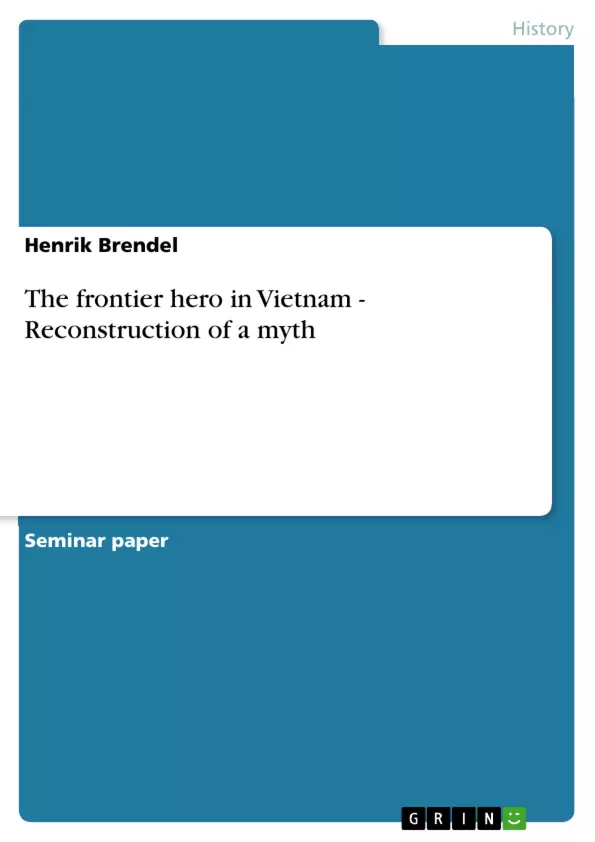In terms of methodology it will be worthwhile first to take a closer look at the theory of collective memory in order to understand its relevance for a nation’s self-understanding and the way that society’s individual members rely on it. In a next step, the concepts of Turner’s frontier myth thesis as well as Kennedy’s New Frontier will be outlined in order to point out the contents of the nation’s mythology and to determine elements to look out for in films. As we will see, the figure of the individual frontier hero will be of paramount importance. Finally, the main part will focus on the way in which the U.S. frontier myth and particularly the frontier hero actually figure within some Hollywood representations of the war. What is the appearance of the frontier heroes and what experiences do they make on the New Frontier in Vietnam? How can these experiences be characterized and set against the traditional qualities of the frontier myth?
Within the framework of this paper, the choice of films must necessarily be exemplary. The three films that will be discussed here are among the most widely distributed films dealing with the Vietnam War. Moreover, as I hope to demonstrate in this paper, they are exemplary for three different ways of responding to the threat that this war posed to the frontier myth: its assertion, its transformation and its dismissal.
Inhaltsverzeichnis (Table of Contents)
- Introduction. Trauma, myth-making and collective memory
- Collective memory
- The myth of the American frontier
- The Hollywood Vietnam hero on the new frontier
- "Rambo - First Blood Part II"
- "The Deer Hunter"
- "Apocalypse Now"
- Conclusion
Zielsetzung und Themenschwerpunkte (Objectives and Key Themes)
This paper aims to investigate the impact of the Vietnam War on the American frontier myth, specifically examining how this impact is reflected in Hollywood films about the war. The paper explores how the frontier myth, as a crucial element of American collective memory, was challenged and potentially reconfigured by the traumatic experiences of the Vietnam War.
- The Vietnam War as a traumatic event for American society
- Collective memory and its role in shaping national identity
- The significance of the American frontier myth in the context of national identity
- The influence of the Vietnam War on the traditional frontier hero archetype
- The representation of the Vietnam War in Hollywood films and its relationship to the frontier myth
Zusammenfassung der Kapitel (Chapter Summaries)
The first chapter introduces the Vietnam War as a traumatic event and explores the concept of collective memory. It raises the question of how this trauma affected the United States' understanding of itself, particularly through the lens of the American frontier myth. The second chapter delves into Maurice Halbwachs' theory of collective memory, examining how societies construct their shared past and the role of symbols and symbolic practices in this process. Chapter three focuses on the American frontier myth, as articulated by Frederick Jackson Turner, emphasizing the characteristics associated with the frontier hero and their significance in shaping American national identity.
Schlüsselwörter (Keywords)
The main keywords and focus topics of this text include the Vietnam War, collective memory, trauma, the American frontier myth, the frontier hero, Hollywood films, and cultural representations. This paper examines the interplay between these concepts, exploring how the Vietnam War impacted the frontier myth and how these themes are depicted in Hollywood films.
Frequently Asked Questions
How did the Vietnam War affect the American frontier myth?
The war challenged traditional national identity, leading to a reconstruction or dismissal of the classic frontier hero archetype in cultural memory.
Which films are analyzed in this study?
The paper examines "Rambo: First Blood Part II", "The Deer Hunter", and "Apocalypse Now" as exemplary responses to the war's impact on mythology.
What is Frederick Jackson Turner's frontier thesis?
It is a theory suggesting that the American frontier experience shaped the nation's character, emphasizing individualism and democratic ideals.
What role does collective memory play in this context?
Collective memory helps a society construct a shared past, using symbols and myths to maintain national self-understanding during traumatic events.
How is the "New Frontier" represented in Vietnam films?
The films portray the experiences of soldiers on a new, often dark and confusing frontier, contrasting them with traditional qualities of the frontier myth.
- Citar trabajo
- Master of Arts Henrik Brendel (Autor), 2008, The frontier hero in Vietnam - Reconstruction of a myth, Múnich, GRIN Verlag, https://www.grin.com/document/188860



